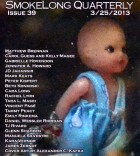I find it refreshing to open a piece of writing and discover that is it moored in history. “Chartres” immediately pulled me in with vivid imagery. What made you decide to write about this particular time and place?
My favorite part about this flash fiction is the history behind it, that the essence of the piece is real. I’ve been reading quite a bit about World War II in Europe, with particular interest in the Nazi art theft and the Allied attempt at recovery and preservation of both works of art and cultural monuments. While reading Robert M. Edsel’s book The Monuments Men, I discovered the story behind the cathedral in Chartres, France: the Germans had set 22 explosive charges around it while they retreated. Chartres was a ghost-town when one of the Monuments Men—enlisted officers tasked with preserving what they could on the front lines— reached the cathedral. Weighing the value of life against the value of art and culture, he chose to risk his life to disarm all of the explosives; afterward he said it was all worth it to be able to spend an hour completely alone inside this cathedral. After reading that account, getting into that character and moment wasn’t difficult at all.
Corporal Penner is given a clear choice in this story; if he continues, he may die; if he doesn’t, a piece of history will be destroyed. What are the other elements you worked toward achieving in “Chartres”?
I aim to bring a character to some kind of choice, decision, or change. To me, fiction works best when characters aren’t recipients of plot, but have agency in the story. It helps readers to identify with the characters and to empathize with the emotional core of the story. In “Chartres,” the stakes are elevated because of the explosive nature of the conflict, and I like working with high-intensity external conflicts as a crucible for my characters.
Ironically, Corporal Penner’s choice to disarm the explosives entered the story as exposition; it wasn’t original to what I saw in the piece. What I was imagining when I began was that moment in the church after all the explosives are disarmed, just standing there in this marvel of architecture and culture, alone, knowing it stood because of him and still feeling the strain of the work. And it’s that change in him, from stress to calm, that I was writing toward as the real climax of the piece. Of course, his prior decision and the high stakes involved in that exposition were necessary in order to achieve the second, quieter moment, and I had to delve into that in order to achieve the moment I wanted.
Your original thought morphed as you worked to deepen the story. Is this a “natural” step in your process? Can you talk a little about your journey as a writer?
I’ve always had an ear for language and always been good at description. But when I started, the way I wrote skewed heavily toward concept rather than character. It took me a long time to transition to writing organically from the characters. One day, the characters in a short story started saying things I hadn’t planned for them to say, things that ultimately changed my ending for the better! After that, I was better able to let go, having faith in the story to develop on its own and giving it the freedom to do so. When I took my first workshops in college, the late Fred Busch talked about how he would sit down to write a novel with absolutely no idea where it was going, or what would happen. Just the characters.
At the time, I thought that sounded impossible! Now, thousands of pages later, that’s how I write. The other significant challenge I’ve faced as a writer was making the transition from short stories to the novel. And I mention this, too, because ultimately it was learning to write from the characters and letting them carry it that allowed me to invest in a story ten times bigger.
So you are working on something longer. Yay! What kind of experience has that been?
I completed my first novel about three years ago as my MFA thesis at Arizona State University. I’m in the process of finding an agent for it now. In the meantime, I’m working on a second novel, and of course, flash fiction. Having spent more than two years in the sustained effort of writing that first book, I moved back to the short story and began exploring the form of flash fiction, and I have found that writing flash—writing about just one moment—helps me constructing scenes in longer projects. It helps with getting into scene and character quickly, too, and concision in language.
Now that I’ve gotten hooked, so to speak, on writing flash fiction, it’s been more difficult to go back to the novel: sustaining one long narrative for an extended duration requires a lot of focus, while a flash I can write in a day or two. As with that short story a long time ago, my novel took on a life of its own and did things that took me multiple revisions to understand fully! I think what surprised me most about writing that first novel was the number of pages I felt went to waste. Now I can see that all that time spent was necessary in order to shape the book properly.
What advice would you give writers starting out?
Patience. In everything. Clearly, writing a full novel manuscript takes time, and there are frustrating elements, which I’ve mentioned above, that you really can’t skip. One of my mentors once told me that for every 500 page book she completed, she would have written about 2,000 pages before trimming it down by 75 percent! That put my “waste” into perspective. Don’t rush into an ending that isn’t organic to your characters and their arcs, by which I mean don’t write toward a chosen ending at all, take the time to let the story unfold. At least that’s what works for me. Patience is necessary in flash fiction, too, though. I was lucky with “Chartres” in the way it really told itself, I wrote the entire thing in one sitting. But that’s uncommon. I think above all, though, my advice to starting writers would be patience in the post-writing phase. The publishing business side of writing can take just as much time and effort as the writing side—sometimes more!—and it lacks that sense of progress and discovery that the writing part promises. I began writing fiction in 2001, started submitting to a few magazines (with full optimism) within a year or two of that. My first publication didn’t come until 2009, and the publishing momentum I have now didn’t begin until 2011. That’s a long time to wait! So be patient and it will come. And in the meantime, always be writing.



 In September 2022 SmokeLong launched a workshop environment/community christened SmokeLong Fitness. This community workshop is happening right now on our dedicated workshop site. If you choose to join us, you will work in a small group of around 15-20 participants to give and receive feedback on flash narratives—one new writing task each week.
In September 2022 SmokeLong launched a workshop environment/community christened SmokeLong Fitness. This community workshop is happening right now on our dedicated workshop site. If you choose to join us, you will work in a small group of around 15-20 participants to give and receive feedback on flash narratives—one new writing task each week.